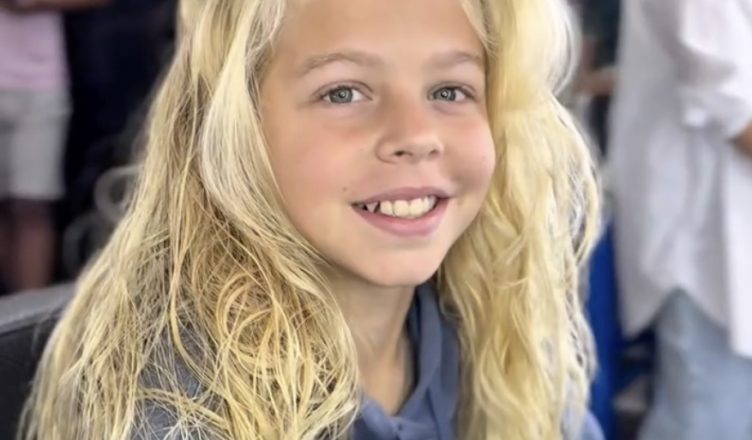For as long as anyone in town could remember, Oliver was the boy with the golden hair.
It wasn’t just long—it was luminous. Each strand shimmered like spun sunlight, falling well past his shoulders in waves so smooth people swore they belonged in a shampoo commercial. When his mother tied it back in a ponytail for school, it swung like a rope of silk. When he left it down, it cascaded freely, catching light in a way that made heads turn.
Neighbors adored it. Teachers complimented it. Strangers, stopping his parents in grocery store aisles, often made the same mistake: “What a beautiful daughter you have.”
At first, Oliver laughed. He was seven, then eight, then nine, and the mix-ups seemed harmless—funny, even. He would roll his eyes and say, “I’m a boy,” and the strangers would gasp, apologize, and chuckle awkwardly. But the more it happened, the less funny it became.
By the time Oliver turned ten, it felt like the hair wasn’t just part of him—it defined him. No matter what he wore, no matter how confidently he introduced himself, people saw the hair and drew their own conclusions. His best friend, Aaron, teased him sometimes, not cruelly but enough to sting. “Hey, Rapunzel, when’s the tower coming?”
Oliver would force a smile. But inside, he hated it.
One morning, he stood in front of the bathroom mirror, tugging at the ends of his hair. His reflection stared back, pale and uncertain. He tried to imagine himself without the golden curtain framing his face, but the thought made his stomach twist.
Yet there was a voice inside him, quiet but insistent. You’re not hiding. You’re ready.
When he walked downstairs for breakfast, he surprised his mother. “Mom,” he said, his voice steady. “I want a haircut.”
She nearly dropped the plate in her hand. “A haircut? Are you sure? You’ve always loved your hair.”
“Not anymore,” Oliver said. His fingers brushed his shoulders, restless. “I don’t want people to get me wrong. I want them to see me—not just this.”
His mother studied him for a long moment, her heart aching with both pride and sadness. She nodded slowly. “Alright, sweetheart. Let’s make it happen.”
That Saturday, Oliver walked into the local barbershop, the bell above the door jingling. The air smelled faintly of shaving cream and aftershave, a blend that felt strangely serious.
The barber, a kind-eyed man named George, smiled as Oliver climbed into the tall leather chair. “So, what’ll it be today, young man?”
Oliver swallowed hard. “Short. Really short. I want it gone.”
George raised an eyebrow. “You sure? That’s a lot of hair to lose.”
“I’m sure,” Oliver said firmly. His palms were sweaty, but his voice didn’t waver.
The cape snapped around his shoulders, and the scissors gleamed in the light. George combed through the thick strands one last time, then lifted his shears.
The first snip echoed like thunder in Oliver’s chest.
Golden locks tumbled to the floor, one after another, until the chair was surrounded by shimmering piles. With every cut, Oliver felt lighter, freer, as though invisible weights were falling with the hair. He held his breath until the scissors paused and George reached for the clippers.
The hum filled the room as the last long strands vanished. Slowly, Oliver’s reflection began to change. His cheekbones appeared sharper, his jawline more defined. His large, brown eyes—once hidden behind waves—now stood out, wide and expressive.
When George spun the chair to face the mirror, Oliver gasped.
He hardly recognized himself.
Gone was the long-haired boy everyone mistook for something he wasn’t. In his place stood someone new—tidy, strong, unmistakably Oliver.
His mother’s hand flew to her mouth when she saw him. “Oh, Oliver…” she whispered. For a moment, she didn’t recognize him either. But then her eyes softened. “You look incredible.”
When they returned home, his father whistled. “Well, would you look at that! Who’s this confident young man?”
Even Aaron, his best friend, was stunned. “Dude, you look awesome. Like… completely different. In a good way.”
Oliver grinned so wide his cheeks ached. For the first time in years, he felt seen. Not as the boy with the hair. Just as himself.
In the days that followed, Oliver noticed subtle changes in how people treated him. Teachers addressed him with newfound respect. Strangers didn’t hesitate or stumble over assumptions. For once, there were no awkward “your daughter is lovely” comments.
But the most important change wasn’t in others—it was in Oliver himself.
He walked taller in the school hallways, his shoulders squared. He raised his hand more often in class, no longer afraid of drawing attention. At soccer practice, he ran faster, unburdened by hair whipping in his face.
The haircut hadn’t just changed how he looked—it had changed how he carried himself.
One evening, as he brushed his short hair in front of the mirror, Oliver paused. The boy staring back was still him—but also someone braver, someone ready for the world to see him clearly.
He touched his head, smiling.
The golden waves were gone, but he hadn’t lost himself. He had found himself.
From then on, whenever people brought up his old hair, Oliver just shrugged. “Yeah, it was cool,” he’d say. “But this is better.”
Because it wasn’t about looking different. It was about finally being recognized for who he truly was.
And as his reflection grinned back at him, Oliver knew: the haircut had been more than a change of style. It had been the beginning of a new chapter—one he was proud to write.
